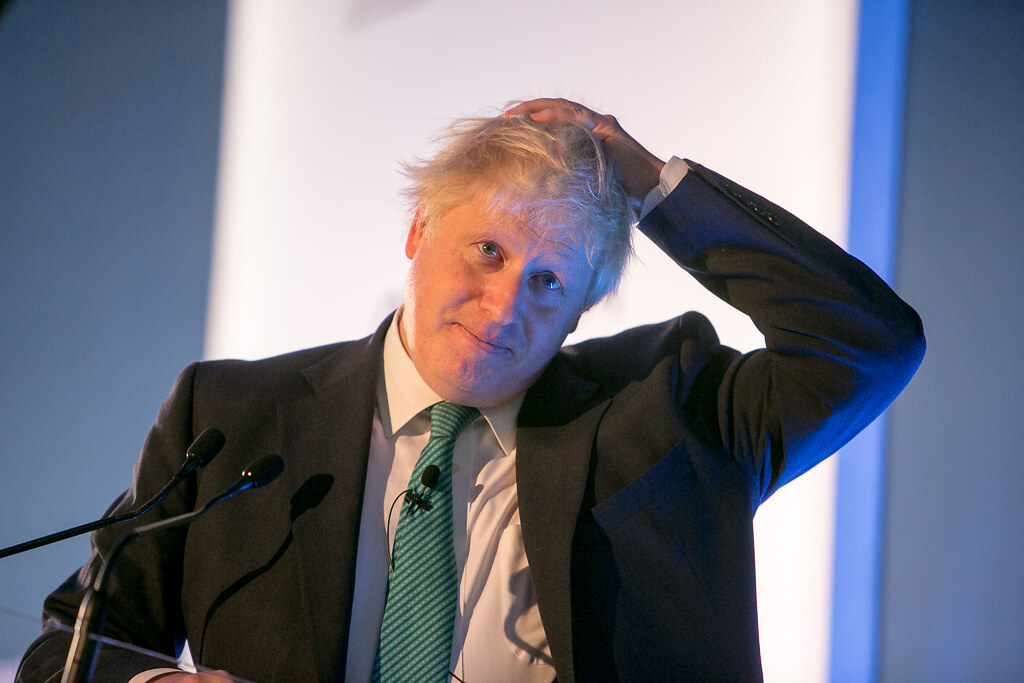The Tories’ strategy for trying to win the general election appears to be to muzzle the whole front bench, above all Boris Johnson; the only thing they are allowed to utter is the pledge to “get Brexit done”.
The Tory manifesto launch, smuggled in on a Sunday to ensure the minimum possible impact, was a continuation of the same approach. Traditionally, election manifestos are an attempt to promise voters jam tomorrow, even when – as with the Tories – up until now, only gruel has been served.
Not this manifesto, however! Despite claiming that the era of austerity is over, new spending pledges were miniscule to the point of being invisible. For every £1 the Tories pledged to spend by the end of the next parliament, Labour has pledged £28.
Johnson had promised the manifesto would contain a solution to the social care crisis, but no proposal was made. Nor did Johnson’s claim that the national insurance threshold would be raised to £12,500 cutting workers’ tax by £500 per year come to anything; instead it will inch up to £9,500, saving about £85 a year.
Such was its stinginess, that even the few pledges it contained turned out to be less generous in reality. The Tories promised to abolish hospital car-parking charges for example – but only for staff on night shift and the terminally ill. So NHS trusts will still be able to make a fortune from NHS workers on the day shift and patients who are only seriously ill!
Lies
One of the only larger-scale proposals included in the manifesto – 50,000 new nurses – was also quickly shown to be less than it appeared. The 50,000 included 18,500 who already work in the NHS but who the government intended to convince not to leave.
One reason for this ‘non-manifesto’ was the painful memory of Theresa May’s unpopular 2017 manifesto. This was a factor – alongside Corbyn’s radical manifesto – in her losing her majority.
The Tories have another – more fundamental – reason for their absence of policies, however. The party is completely divided, splitting before our eyes, and is anxious to disguise this during the election.
Nonetheless, the manifesto makes it clear that a future Tory government would be united in its need to continue attacking the rights and living conditions of the working class. Universal Credit, with all its accompanying misery would remain, as would the brutal ‘hostile environment’ for migrant workers.
The outrageous anti-democratic court ruling to block the Communications Workers’ Union (CWU) strike has already given a glimpse of the further attacks on trade union rights we should expect if the Tories are reelected. This was hammered home in the manifesto; in response to the ongoing heroic struggle by the transport workers’ union, the RMT, against driver-only-operated trains, the Tory manifesto proposes to make it illegal for train workers’ strikes to stop more than a certain number of trains running.
The Tory manifesto drives home the need to get them out of office on 12 December. Corbyn’s anti-austerity manifesto could propel him into Downing Street.
That is what the Socialist Party is campaigning for. Clearly, however, it is not excluded that attempts by the capitalist class to prevent Corbyn’s election – backed to the hilt by the Blairite wing of Labour – could still succeed.
If Corbyn does not win, the primary reason for it will be the failure of Corbyn and his supporters to transform Labour into a workers’ party – trying, instead, to mistakenly compromise with the backstabbing Blairites.
It would be a big mistake, however, to imagine that a Johnson government, even if he managed to scrape a majority, would be in a strong position to attack the working class. That, of course, would be his intention. But he would be heading an extremely divided and weak government that has blithely promised to “get Brexit done”, and will find the reality of doing so protracted and complicated.
Johnson is not trusted by the majority of the capitalist class. They see in his manifesto pledge not to extend the Brexit transition period beyond December 2020 the danger of a chaotic crash out of the EU. Of course, in the event – under huge pressure from the capitalist elite – he might then retreat, disillusioning the Brexiteers who voted for him.
But the process is likely to be chaotic, and to take place against the background of a new economic crisis. Johnson’s authority could be even more rapidly eroded than John Major’s was after the Black Wednesday crash of September 1992, following his general election victory in April.
Tory splits
Further splits in the Tory Party would also be posed. Although a phalanx of pro-remain Tories have been ejected from the party, there are still likely to be over one hundred of them on the back benches post general election.
The working-class vote for Brexit was – at base – a revolt against the misery suffered by millions over decades. Whatever happens on 12 December, that anger will find new outlets. Chile – albeit in a different form – will come to Britain.
The Tories themselves are aware of the social explosions that are looming. That is why, despite the paucity of policies in their manifesto, they have already promised to increase public spending dramatically. Chancellor Sajid Javid is promising to spend £13.4 billion on capital expenditure in 2020-21 and £20 billion a year for the following years.
Pledges on day-to-day public spending have also rocketed. Threatened by Corbyn winning the election, the Tories have been forced – as yet in words – to abandon austerity.
This will anger the millions who have suffered Tory austerity, and were told it was necessary to see homelessness rocket and children driven into poverty. It also gives a glimpse of the potential power of the working class, if it were organised in a mass party, armed with a socialist programme.









